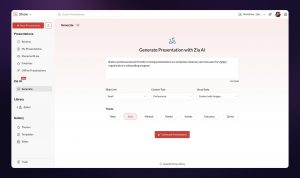
The conversation around CRM (customer relationship management) is always shifting. Over the past several years, we’ve seen cycles of increased focus on enterprise CRM technology and strategy and periods where the conversation has largely centered on the ways in which small and midsized businesses (SMBs) can utilize these tools to compete with larger corporations. At times we’ve seen a lot of buzz around CRM technology in specific industries (real estate, insurance and financial services comes to mind) and yet there’s also been a push toward customization and adaptability, particularly in the SMB space, for the CRM to flex to fit the needs of the specific business — regardless of their vertical or geographic location.
This is all part of the ebb and flow of the technology as providers race to meet the evolving needs of the day’s business landscape. However, there has been one sizable shift which has developed slowly but is really picking up steam in 2019 — and that is the move toward all-in-one CRM solutions.
When was the last time you read an article, saw a news item or held a conversation or planning meeting about your business’s CRM needs that focused solely (or even primarily) on contact management? More than likely, not any time in recent memory. Instead, any discussion of CRM today will almost invariably include a focus on additional connected tools and services that businesses are increasingly expecting to see included as part of the broader CRM solution.
And there’s good reason for all the chatter about all-in-one CRMs. For starters, they provide more features that help improve customer interactions that, in turn, can lead to increased transactions if utilized correctly. They can help improve communication — both between the business and its customers and between departments like sales, customer service, tech support, R&D and the organizations management. Last but not least, bundling additional features into an all-in-one CRM can help drive the price down significantly.
CRM providers have caught on and are beginning to position themselves as all-in-one solutions ready to handle all your business’s needs, both now and as you grow in the future. However, upon closer inspection this isn’t always the case. Many CRM providers will add a tool here, a feature there and try to pass their technology off as all-inclusive. But if you’re considering adopting an all-in-one CRM solution, there are a variety of features you’ll want to make sure the product you’re looking at has covered to make sure your business will be able to benefit from all the opportunities that come with a truly comprehensive platform.
First, you’ll want to make sure any all-in-one CRM you evaluate is built on solid, easy to use contact management technology. While many CRMs are looking to stretch into supporting sales, marketing and other business functions, the reverse can be true as well. If the tool you’re looking at doesn’t appear to have a well-built contact management dashboard that easily captures and displays all of your essential customer info, understand that this may be a marketing or sales-based tool that is adding in a layer of contact management functionality rather than using this core CRM technology as its basis.
Next, take a look at the automation technology included in the software. A recent Forrester report revealed that marketers have already spent more than $11 billion on automation solutions — and are projected to more than double that spending by 2023. With both current and projected adoption rates this high, marketing and sales automation technology is becoming increasingly vital in any all-in-on CRM solution. And it’s no surprise, the right automation tool can help maximize the efficiency and impact of email marketing campaigns and provide insight into website, marketing and sales material engagement. An effective marketing automation tool natively integrated into your CRM can help accelerate sales and provide the boost you need to scale your business quickly.
Additionally, if you’re looking for a robust, all-inclusive CRM solution, be sure to evaluate the platform’s predictive analytics technology. Understanding the most effective course of action throughout each touchpoint with a current or prospective customer is an essential component of effective CRM technology in today’s business environment. As your customer moves through the sales funnel, your CRM should be able to tell you — based on both your interactions with that specific customer and similar interactions with others — the best way to communicate with them to ultimately produce a sale.
Finally, get a feel for the API of a prospective CRM and whether or not the platform is designed to seamlessly accommodate valuable third party applications. No single CRM can have everything natively built into their solution. Therefore, it’s essential that any CRM purporting to be an all-in-one solution be able to deliver high value platform integrations with third party solutions to help deliver a truly comprehensive tool that provides the highest level of utility for the end user.
All-in-one is indeed the future of CRM and this technology will increasingly be relied on to serve as the hub of a business’s sales, marketing and customer experience efforts. However, not all CRMs are equal and they aren’t all ready for that future today. Take some time to consider how your existing CRM, or the solution you’re evaluating, measures up against these touchpoints for true all-in-one capabilities and you should have no trouble finding the right technology for your business.
*Source: https://betanews.com/2019/07/18/all-in-one-standard-in-crm/
Are you thinking about using Zoho CrM for your business? Visit our Zoho Advanced Partner page to learn how we can help you.



